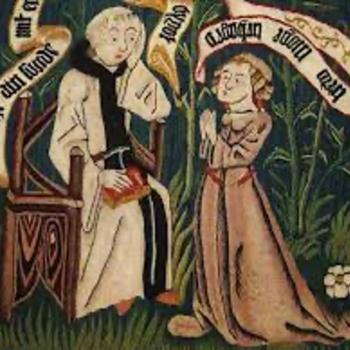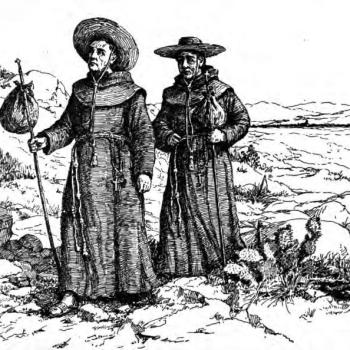This semester I am teaching a sophomore seminar entitled “Historical Methods.” Since I teach at a Christian college, we spend a lot of time in this course thinking about the relationship between Christianity and the practice of doing history. This morning I taught a wonderful essay by George Marsden entitled “Human Depravity: A Neglected Explanatory Category.” The essay appears in Wilfred McClay’s edited collection, Figures in the Carpet: Finding the Human Person in the American Past (Eerdmans, 2007). This article is must reading for all Christian academics, whether you are a Calvinist or not. (I am assuming that all Christians maintain some kind of belief in human depravity–correct me if I am wrong). Marsden reflects on what the stories we tell about the past might look like if we took the reality of sin seriously.
During class we discussed the idea that God has created us with freedom. Every human person, created in the image of God, has the natural right to be recognized as a responsible and free being. This is an important part of God’s image within us. The freedom to make choices with our lives can lead us toward a life of communion with God, but it can also lead us into sin. Human beings have made the choice to prefer themselves to God. Christians believe that because of what happened in Genesis 3, the image of God has been tarnished by sin. Our natural inclination is toward selfishness rather than toward the pursuit of God or love of neighbor.
But how might the Christian belief in human sin influence our work as historians? The historian Herbert Butterfield informed us that “if there is any region in which the bright empire of the theologians and the more murky territory of the historians happen to meet and overlap, we shall be likely to find it at those places where both types of thinkers have had to deal with human nature.” (Christianity and History, 1957). Marsden adds: “Of all traditional Christian teachings the doctrine of original sin or of pervasive human depravity has the most empirical verification. The modern world, rather than undercutting this doctrine, seems to increasingly confirm it.” Indeed, anyone who studies the past realizes that there are no heroes in history. At first my students balked at this idea, but I continued to press the point. I suggested that people often perform heroic acts and rise about their broken circumstances, but in the end all human beings are tainted by sin and are susceptible to acting in ways that preference themselves over others and God. Historians understand, perhaps better than most, the reality of pain, suffering, injustice, anger, and vice brought upon by sin. They understand the tragic dimensions of life.
Several students started to come around. A healthy doctrine of human depravity, they argued, might help us to understand the behavior of historical figures likes Nero, Caligula, Hitler, Stalin, and Pol-Pot. Such a belief in the reality of human sin should also provide us with a healthy skepticism about movements in the past committed to utopian ends, unlimited progress, or idealistic or “pie-in-the-sky” solutions to the problems of the world. This, of course, does not mean that we should stop working toward these ends, but history certainly teaches us that we live in a broken world that will not be completely fixed on this side of eternity. Similarly, a belief in depravity helps us to better explain the human condition–the restlessness, search for meaning, and prideful ambition that has defined much of the past, especially in the modern era. St. Augustine was quite correct when he opened his Confessions with the famous phrase, “our hearts are restless until they rest in you.” Or, to quote Bruce Springsteen, we are all “born to run.”
A belief in human depravity might also influence the process by which we craft our narratives of the human experience. Take, for example, the study of American history. The teaching of the American past has always served a civic function in the United States. School children learn American history for the purpose of becoming informed and patriotic citizens. What has resulted from this belief is a skewed view of the American experience that celebrates certain heroic figures to the neglect of others. Such an approach also focuses on American greatness as defined by the patriotic designers of school textbooks. In such a curriculum American nationalism triumphs over the stories chronicling those moments when the United States has failed or acted in ways that might be considered unjust. If you think that this no longer happens today, just take a look at the recent controversy over social studies curriculum in Texas.
Such an approach to American history is not only one-sided, but it fails to recognize the theological truth that all kingdoms and nations are flawed when compared to the Kingdom of God. While the stories we tell about the United States should certainly not neglect the moments that make us feel good about our country, we should also not be surprised when we encounter stories that might lead us to hang our heads in collective shame. While such a whitewashing of American history is quite popular these days among those on the political or cultural Right, those who occupy a place on the political or cultural Left can also ignore the realities of human sin on the subjects or individuals that they find to be inspirational. Yes, as Marsden reminds us, it is “a sign of maturity” when “representatives of a group can write history that takes into account that members of that group are flawed humans like everyone else. In the long run the most convincing histories will be those that portray their protagonists with faults as well as virtues.”
Finally, the reality of sin in this world also affects what we can know about the past. As historian Mark Noll has argued, “the doctrine of the Fall and the resultant depravity of human nature suggest that the human moral condition obscures vision, presumably for historical as well as moral reasoning.” Ephesians 4:18 teaches us that sin “darkens the understanding.” Indeed, we “see through a glass dimly.” (1 Cor. 13:12). These limitations on human knowledge should humble historians and serve as a caution against the temptation to claim, particularly in the public sphere, that we speak with an authoritative certainty about what happened in the past.
What if we taught and wrote history as if human depravity mattered?












